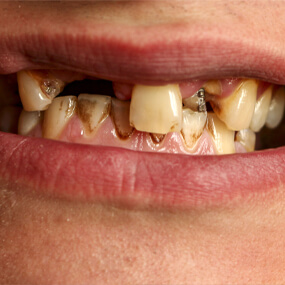Top 11 Reasons to Focus on Your Oral Health

Brushing your teeth gets rid of the plaque that can lead to bad breath, gum disease, cavities, and even tooth loss. Did you know it also plays a vital role in avoiding other diseases?
The American Dental Association recommends that you brush twice and floss once every day. Of course, we all lead busy lives, and sometimes the basics fall by the wayside. The Journal of the American Dental Association published research in 2018 that found that more than 40 percent of Americans age 30 and up have gum disease. But gingivitis and the more serious periodontitis are only a part of the problem. The ADA warns that inflammation is the main symptom of periodontal disease, and it affects your entire body.
Medicine is still determining the full scope of the connection between poor oral hygiene—inflammation in particular—and disease. But recent research shows even more interconnection than we might have suspected. John Pfail, DDS, Chief of the Department of Dentistry at Mount Sinai-New York, likens the bloodstream to a highway that can carry oral bacteria and toxins to sites throughout the body.
While the link between dental health issues and overall health complications may not yet be fully appreciated, we know enough to say that preventative dental care is imperative to well-being and long life. With that in mind, the ADA recommends consistent oral hygiene at home and limiting sugary and acidic foods and beverages. It also stresses that you should visit your dentist regularly and adhere to his or her personalized advice for you because that trumps general recommendations.
How Good Oral Hygiene Can Benefit You Beyond Your Mouth
Taking care of your teeth and gums on a consistent basis can help you:
1. Reduce risk of heart disease
Dr. Pfail noted a connection between heart disease and oral bacteria that reaches the blood. Oral bacteria can travel via the blood throughout the cardiovascular system and accumulate. It can cause infections in various parts of the heart and put you at greater risk of strokes and heart attacks.
Inflammation is a natural response from your immune system to such infections. However, Dr. Messina, a colleague of Dr. Pfail, notes that chronic inflammation is particularly concerning and is the nexus between your oral health issues and systemic health complications. The chronic nature of the inflammation can put you at two to four times greater risk of developing heart disease.
2. Lessen risk of a stroke
Drs. Messina and Pfail also noted that eliminating those risk factors associated with heart disease could lessen your susceptibility to a stroke. Gum disease is caused by bacteria. Those same bacteria have been identified in plaque that accumulates in blood vessels and has been linked to strokes. The Journal of Clinical Periodontology published a 2019 Taiwanese study to this effect. The study demonstrated that patients with periodontitis were more prone to strokes, had a significantly lower 10-year survival rate, and could lessen their risk by being treated for gum disease.
3. Mitigate the effects of high blood sugar
An aspect of diabetes of which many people are not aware of is that it has a mutual relationship with dental health. In other words, dental health problems can lead to Type 2 diabetes as well as exacerbate T2D symptoms, and T2D can lead to and worsen various oral health complications. This often creates a nasty cycle in people who have poor oral health and are managing diabetes at the same time.
The National Institute of Health informs that a person with unmanaged diabetes will have high glucose levels in their saliva, and these high levels prompt the development of bacteria linked to gum disease. In addition, diabetics often experience xerostomia—dry mouth. Xerostomia not only puts you at greater risk of cavities but promotes a fungal growth that can lead to the infection thrush.
Dr. Pfail warns that any oral health issue is complicated by diabetes. Diabetes negatively affects your body’s ability to heal and fight infections, such as gum disease. Likewise, dental problems complicate diabetes because they make it much more difficult to control blood sugar levels.
4. Improve metabolic syndrome
According to the Mayo Clinic, metabolic syndrome is a group of conditions that can occur together. These factors can lead to one another or exacerbate each other, and this cluster of conditions is often linked to diabetes, strokes, and heart disease. These risk factors include obesity, high blood sugar, hypertension, and high blood fats. Age and even ethnicity can also play a role.
Since a connection has been made between periodontal disease and diabetes, strokes, and heart disease, does that mean gum disease is related to metabolic syndrome as well? Medicine does not have a definitive answer yet, but there is certainly evidence pointing in that direction.
Dr. Akosa, dental director of Rutgers Health University, says that periodontal disease has been linked to metabolic syndrome by inflammation. She noted a number of studies that asserted that periodontal disease should be included within metabolic syndrome, but she tempered that evidence by noting that such studies have not yet demonstrated these relationships at a fundamental level.
5. Be less susceptible to lung diseases
Dr. Messina noted that the connection between pneumonia and other lung diseases was obvious because we are able to directly inhale bacteria from our oral cavities into our lungs. The bacteria found in an unhealthy mouth can certainly lead to pneumonia and other lung-related health issues.
The Salem Medical Center in Virginia is among the pioneers in this area of medicine. Researchers there published a study in the journal Applied Nursing Research in which it found that having nurses brush the teeth of patients reduced the rates of pneumonia by a staggering 92 percent.
Dr. Pfail added that these effects are not limited to prevention. Recent research has shown that various oral diseases, including gum disease, can worsen respiratory conditions and symptoms. This happens because bacteria in the mouth and upper throat make their way into the respiratory tract.
6. Detect osteoporosis earlier
An important aspect of taking care of your mouth is seeing your dentist on a regular basis. The ADA advises at least an annual visit, and most dental health professionals recommend biannual visits even if you are in good health. The role dentists play in general health care is often underappreciated. They are often the first medical professional to diagnose health issues that extend beyond the mouth.
Osteoporosis is one such condition, and what is interesting about this disease is that it can often be difficult to diagnose early. Your dentist, however, will take dental X-rays, which the NIH recognizes as one of the most effective screening tools for osteoporosis. If you have osteoporosis, that bone loss will be apparent in your teeth, jaw, and other bones near your mouth.
Early detection of osteoporosis is very important. Women with the condition become three times more susceptible to tooth loss. In addition, research has found a link between osteoporosis and periodontal disease in that the symptoms of osteoporosis make people more prone to oral bacteria.
7. Reduce the risk of dementia
There is growing evidence that bacteria linked to gum disease can travel to the brain and encourage the onset and exacerbate Alzheimer’s disease and other types of dementia. Some researchers are approaching Alzheimer’s as if it is a brain infection. Porphyromonas gingivalis—a bacteria associated with gum disease—has been found in the brain of patients with Alzheimer’s, and there are already FDA-approved clinical trials of drugs intended to target and block P. gingivalis in the brain.
An abundance of peer-reviewed research has now demonstrated a link between Alzheimer’s and gum disease, including a 2017 Taiwanese study published in the journal Alzheimer’s Research and Therapy. There is also growing evidence that poor oral health can negatively affect our mental acuity throughout our lives. If there is a chance that brushing and flossing daily and having your teeth cleaned by your dentist can protect and improve your memory-related capabilities, then, as Dr. Messina put it, why would you not do that? We do not need concrete evidence for preventative care to be appropriate.
8. Lower your risk of cancer
Modern medicine is also uncovering increasing evidence of a link between gum disease and cancer. Particularly noteworthy research was conducted as a joint effort between Tuft and Johns Hopkins Universities that encompassed more than 7,500 patients over a 15-year period. The 2018 paper was published in the Journal of the National Cancer Institute, and it found that subjects who had severe gum disease at the start of the study were 24 percent more likely to get cancer later in life.
Lung cancer was particularly prevalent among these subjects—including those who had never smoked. A paper published in the British Journal of Cancer later that year presented a working theory that oral bacteria is contributing to tumors in the mouth as well as gastrointestinal tract.
Another facet is that cancer patients may be at greater risk of oral health issues because their immune systems are diminished and less capable of fighting off infections. Treatments like chemotherapy further weaken the immune system and delay healing and make it impossible in some cases. Dr. Pfail notes that radiation therapy can damage saliva glands, which leads to a greater risk of cavities. People diagnosed with cancer should also coordinate with their dentists in order to prevent dental complications as well as ensure that oral issues do not interfere with the treatment and management of the cancer.
9. Avoid rheumatoid arthritis and lessen its symptoms
Rheumatoid arthritis (RA) is a chronic auto-immune disorder that causes swelling, warmth, and pain in the joints. RA is inherently an inflammation disease, and people affected by it will want to reduce inflammation in the body as much as possible. Periodontal disease is among the most common types of inflammation, and reducing that bacteria could mitigate the body’s overall response to inflammation.
Dr. Akosa notes that while there is evidence of a link between gum disease and RA, no clear cause and effect has been established. Some research has demonstrated that people with RA are eight times more susceptible to periodontitis. Other studies have shown that P. gingivalis can worse RA symptoms, and others still assert that P. gingivalis actually triggered the disease in a subset of patients. One thing is clear: gum disease and rheumatoid arthritis share inflammation in common. Good oral health could reduce the incidence of RA as well as the severity and certainly could not hurt.
10. Reduce the risk and severity of kidney disease
Research has also shown an association between oral health and kidney disease. Dental diseases are known to complicate kidney diseases and worsen the symptoms. In addition, a study in the Journal of Periodontology—which focused on African-American subjects due to that group being more susceptible to kidney problems—found that those subjects with advanced periodontal disease were four times more prone to developing kidney disease.
A separate study published in the same journal found higher mortality rates among people with kidney disease and periodontal disease as opposed to just kidney disease. The study spanned 14 years, and the difference between the two groups was 9 percent. Dr. Akosa notes that not only are the infections related to dental diseases problematic for people with kidney disease, but those problems are often exacerbated because the weakened immune systems make them more susceptible and make it more difficult to fight the infections.
11. Reduce the risk of a premature birth
Pregnant women must take special care of their teeth and gums because the hormonal changes in their bodies make them more vulnerable to oral issues than they would otherwise be. According to the Centers for Disease Control and Prevention, as many as 75 percent of pregnant women have gingivitis, which is much higher than for adult women in general. Furthermore, the CDC warns that even seemingly minor gum disease like gingivitis can cause premature births and low birth weights. Dr. Messina adds that having your teeth cleaned is particularly beneficial to your unborn child and that pregnant women should coordinate with their dentists so that proper oral hygiene is a core component of managing their pregnancies.
Protect Your Health Through Comprehensive Oral Care
The benefits of good oral health extend far beyond your mouth. Enjoying healthy gums and teeth begins at home with proper and consistent oral hygiene. But you also need to see your dentist on a regular basis to have your teeth professionally cleaned and to have an examination performed. Jeffrey D. Clark, DDS, is a highly trained and experienced dentist who is dedicated to helping his patients enjoy beautiful smiles and high quality of life. Schedule your visit with Dr. Jeff today by calling Scottsdale Cosmetic Dentistry Excellence at 480 585 1853.




